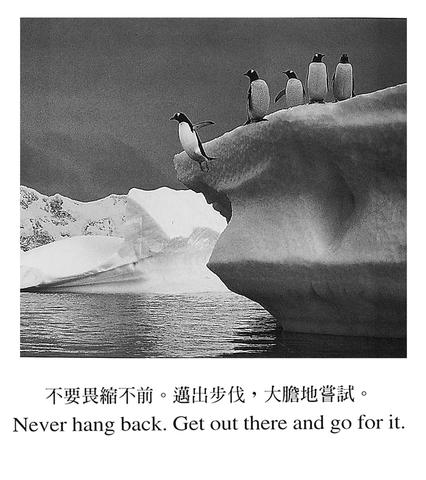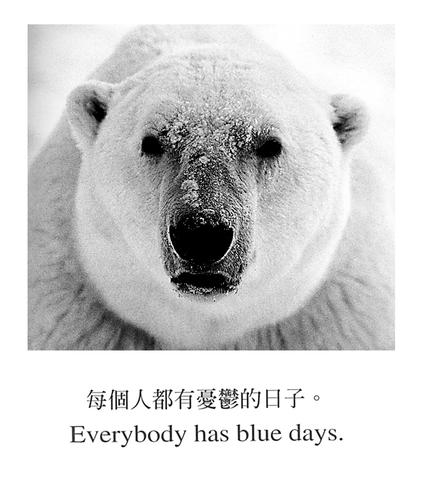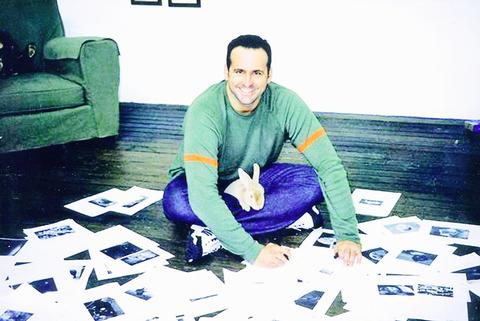It's hard to picture the clean-cut, soft-spoken and easygoing Australian author Bradley Trevor Greive toting the latest in NATO-issue hardware. After all, the contents of his series of bestselling heart-warming illustrated narratives -- The Blue Day Book, Dear Mum and Looking for Mr Right -- are relaxing, thought provoking and most un-war-like.
Until the early 1990s, however, the mild-mannered Greive was a heavy weapons specialist in command of a paratroop rifle platoon in the elite Australian airborne battalion, 3RAR. However odd it may sound, this military background was, according to the author, one of the main driving forces behind the concept that has seen him sell roughly two million copies of his books worldwide to date.

"You learn to survive in the paras with a sense of humor. It might be a bit of a masochistic type of humor, but you learn to deal with whatever is thrown at you through humor," Greive said. "Which, after all, is not that far removed from how we deal with life in general." After leaving the army Greive did a brief stint as a cartoonist with the Sydney Morning Herald. There he tamed his rather brash military humor and went on to enjoy success with a series of cartoons that depicted famous and infamous people at moments during their childhood.

PHOTO COURTESY OF HUANG PUBLISHING
On leaving the newsroom to concentrate on his own projects and find a suitable publisher, Greive soon found that getting a book published was not quite the easy task he'd initially expected it to be.
"When I quit the newspaper business my life took a downturn. I'd had manuscripts rejected by about 30 Australian and 10 US publishers and was feeling pretty down about life in general," he continued. "The idea for the book came to me after I wrote a line of poetry in a cafe in Sydney while feeling blue."

After penning the sentence "the world turns gray and I grow tired," adding a picture of a tortoise sleeping on its back and picturing a gray world, Greive suddenly realized that this monochrome way of looking at life was how dogs saw life and they never seemed miserable. And thus was born the concept behind The Blue Day Book, a book of less than 100 pages of photos and even few sentences. It would be another two years before Greive finally saw his concept in print.

The wait was worth it, however. Less than six months after The Blue Day Book was published, Greive's collection of photographs of animals with human characteristics found itself not only in the number one position on Australia's bestseller list, but had also made the number seven slot on The New York Times' bestseller list.
Since the phenomenal success of his first photo narrative, The Blue Day Book in 2000, the former paratrooper has moved as far away from satire as is possible. The most celebrated of all antipodean writers, both at home and overseas now concentrates on a more easily appreciated and mellow style of humor. His style is now far less reliant on satire and is instead aimed at everyday folk and their thoughts apropos to love and life regardless of gender or race.

PHOTO COURTESY OF FNAC
"The books are fun. There's nothing special to them and they don't preach, which is one of the reasons I guess they've been so successful in so many parts of the world," he continued. "They put suggestions forward and people see themselves or their friends in the images."
Filled with heart-warming anecdotes and observations of life, the books that have made Greive a household name from Tokyo to Rio have now been translated into half a dozen languages.
While his books continue to make bestseller lists the world over; there have been a few hiccups. The most notable of which has been the omission of photo credits on the Taiwan and Brazilian publications of his works.
"This is a problem that has occurred in two places and one that will be put right when I've spoken with my publisher," Greive said. "On all other copies there are photo credits and it is explained where each photograph originally came from." Another problem that Greive has found himself with is the categorizing of his works. According to the author, he's discovered his books in self-help, children's, humor and even philosophy sections of bookstores. Not that the miss-labeling or missing photo-credits has Greive that worried, as he reckons the three reasons behind the global popularity of his books will continue to ensure their success regardless of category of credits.
"It's simply a case of simplicity, poetry and, of course, a good dose of humor."

On April 26, The Lancet published a letter from two doctors at Taichung-based China Medical University Hospital (CMUH) warning that “Taiwan’s Health Care System is on the Brink of Collapse.” The authors said that “Years of policy inaction and mismanagement of resources have led to the National Health Insurance system operating under unsustainable conditions.” The pushback was immediate. Errors in the paper were quickly identified and publicized, to discredit the authors (the hospital apologized). CNA reported that CMUH said the letter described Taiwan in 2021 as having 62 nurses per 10,000 people, when the correct number was 78 nurses per 10,000

As we live longer, our risk of cognitive impairment is increasing. How can we delay the onset of symptoms? Do we have to give up every indulgence or can small changes make a difference? We asked neurologists for tips on how to keep our brains healthy for life. TAKE CARE OF YOUR HEALTH “All of the sensible things that apply to bodily health apply to brain health,” says Suzanne O’Sullivan, a consultant in neurology at the National Hospital for Neurology and Neurosurgery in London, and the author of The Age of Diagnosis. “When you’re 20, you can get away with absolute

May 5 to May 11 What started out as friction between Taiwanese students at Taichung First High School and a Japanese head cook escalated dramatically over the first two weeks of May 1927. It began on April 30 when the cook’s wife knew that lotus starch used in that night’s dinner had rat feces in it, but failed to inform staff until the meal was already prepared. The students believed that her silence was intentional, and filed a complaint. The school’s Japanese administrators sided with the cook’s family, dismissing the students as troublemakers and clamping down on their freedoms — with

As Donald Trump’s executive order in March led to the shuttering of Voice of America (VOA) — the global broadcaster whose roots date back to the fight against Nazi propaganda — he quickly attracted support from figures not used to aligning themselves with any US administration. Trump had ordered the US Agency for Global Media, the federal agency that funds VOA and other groups promoting independent journalism overseas, to be “eliminated to the maximum extent consistent with applicable law.” The decision suddenly halted programming in 49 languages to more than 425 million people. In Moscow, Margarita Simonyan, the hardline editor-in-chief of the